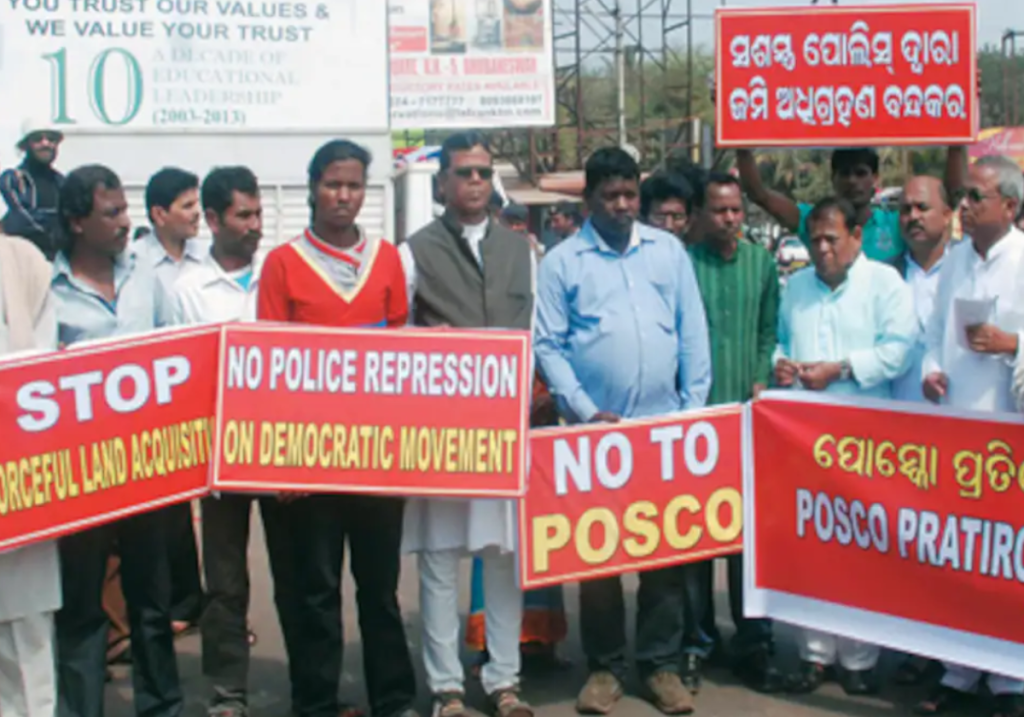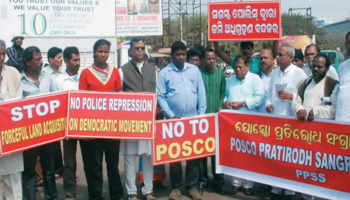
“Environment management has been a priority area for Jindal Steel and Power. We have been treading the difficult path of maintaining our profitability without compromising on our efforts to reduce environmental impact. Through our innovations we have proved that environmental conservation and profitability is not an oxymoron if we apply innovation”, reads the website of Jindal Steel and Power which claims to be committed to Green Steel.
In sharp contrast, their recent project at the mouth of Jatadhari river in Jagatsinghpur district in Odisha to set up a 13.2 Million Tonne Per Annum (MTPA) steel plant, 900 MW Captive power plant, 10 MTPA cement plant with a multi-cargo all-weather captive jetty for handling 52 MTPA capacity cargos tells a different story. The affected villages are Dhinkia, Gobindpur, Nuagaon, Polanga, Bayanala and Jatadhar.
This project is planned to be built over 2700 acres of forest and fertile agricultural land which has been the traditional home to local indigenous communities. Further, the region has over 43 varieties of medicinal plants, 10 species of mammals, 5 species of reptiles, 4 species of amphibians and over 60 floral species according to the Environment Impact Assessment (EIA) study conducted by both JSW Utkal Steel Limited and Water and Power Consultancy Services Limited (WAPCOS). This region is also rich in mangroves which help combat the wrath of cyclones.

The struggle for preservation of the rich biodiversity against corporate greed is not new in the region. Land grab and violation of the rights of adivasi people began in early 2005 when the South Korean steel giant POSCO proposed a 12 MTPA project in the area which is a protected region under Schedule V of the Constitution of India. Land under the Fifth Schedule can not be acquired by non-adivasis and any project in the region has to be ratified by the gram sabhas. A high-level Clearance Committee of the central Ministry of Environment Forests and Climate Change (MoEFCC) and Odisha government however handed over the land to POSCO without consulting the gram sabha. After a decade long struggle on the ground and in the courts, POSCO was forced to pull out of the project in the year 2017. As per the Land Acquisition, Rehabilitation and Resettlement Act of 2013 the 2700 acres of land acquired for the POSCO project was to be returned to people. In violation of the law, the Industrial Infrastructure Development Corporation of Odisha (IDCO) began building a wall along th is disputed land leading to another prolonged legal battle. The National Green Tribunal ultimately ordered a ban on this illegal construction.
The story of this land did not end here. In 2019, the same land was awarded to JSWUL for iron mining and a thermal power plant along with the permission to draw 53.8 million gallons of water per day from the Jobra barrage on the Mahanadi river for the plant.
In 2020, the gram sabhas of the 8 affected villages once again passed a resolution against the project. In May 2021, the Expert Appraisal Committee (EAC) asked the company to look for an alternative water source and to protect the sand dunes present in the region where the company is planning to construct a jetty. Despite the resolution of the gram sabha and concerns raised by the EAC, Jindal Steel this time got a MoEFCC clearance without any changes in its proposed water drawing plan and layout map which would destroy the sand dunes.
On the other hand, JUSL has expanded their CSR activities in the region and proposed to enhance the compensation for prawn ponds to Rs 2.5 lakh instead of Rs 2 lakh and for betel vine plots to Rs. 17.5 from Rs 11.5 lakh an acre in their effort to divide the people who are opposing the project. What the company is not able to achieve legally, they are using the extra-legal method of buying over the opposition at the cost of the people of the region and the planet.

